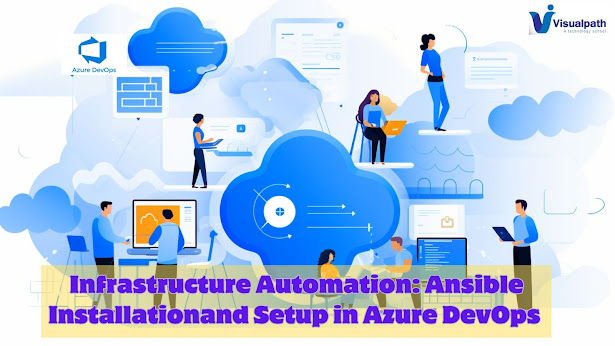Simplifying Infrastructure Automation: Ansible Installation and Setup in Azure DevOps
Azure
DevOps, Microsoft's integrated suite of development tools, offers seamless
integration with Ansible, a leading automation platform, enabling organizations
to automate infrastructure provisioning and configuration within their DevOps
pipelines. Setting up Ansible in Azure
DevOps ensures streamlined deployment and management of infrastructure
resources, enhancing efficiency and agility in software delivery. Let's explore
the steps to install and configure Ansible in Azure DevOps for effective
infrastructure automation. Azure DevOps Training
Installation of Ansible in Azure DevOps:
Azure DevOps
Project Creation: Begin by creating
a new project or selecting an existing project in Azure DevOps where Ansible
will be integrated.
Pipeline
Configuration: Navigate to the
Pipelines section within your Azure DevOps project and create a new pipeline.
Select the appropriate repository containing your Ansible playbooks and
configuration files.
Agent Pool
Selection: Choose the
appropriate agent pool for running Ansible tasks. Azure DevOps provides hosted
agents or self-hosted agents that can be configured on virtual machines or
physical servers.
Azure DevOps Training Online
Setup and Configuration:
Ansible
Installation: Within your Azure
DevOps pipeline, add a task to install Ansible on the selected agent. This can
be achieved using a script task or a pre-built Ansible installation task
available in the Azure DevOps marketplace.
Credentials
Management: Ensure that
credentials for accessing target hosts are securely managed within Azure
DevOps. Use Azure Key Vault or secure variables to store sensitive information
such as SSH keys or passwords. -Azure DevOps Course Online
Inventory
Configuration: Define the
inventory of hosts to be managed by Ansible within your Azure DevOps pipeline.
This can be achieved by dynamically generating the inventory file or using
Azure Resource Manager (ARM) templates to define infrastructure resources. Microsoft Azure DevOps Online Training
Verification and Testing:
Pipeline
Execution: Run the Azure
DevOps pipeline containing Ansible tasks to verify connectivity to target
hosts and execute infrastructure automation tasks defined in your Ansible
playbooks.
Integration
Testing: Validate the
effectiveness of Ansible automation by deploying sample infrastructure
configurations and verifying the desired state of the infrastructure resources.
Azure
DevOps Training in Hyderabad
Conclusion:
In
conclusion, integrating Ansible into Azure DevOps empowers organizations to
automate infrastructure provisioning and configuration seamlessly within their
DevOps workflows. By following the steps outlined above, organizations can
leverage the power of Ansible to enhance operational efficiency, accelerate
deployment cycles, and achieve greater agility in managing their infrastructure
resources on the Azure cloud platform.
Visualpath is the
Best Software Online Training Institute in Hyderabad. Avail complete Azure DevOps
Online Training worldwide. You
will get the best course at an affordable cost.
Attend Free Demo
Call on - +91-9989971070
Visit: https://visualpathblogs.com/
WhatsApp: https://www.whatsapp.com/catalog/919989971070
Visit https://visualpath.in/Microsoft-Azure-DevOps-online-Training.html




Comments
Post a Comment